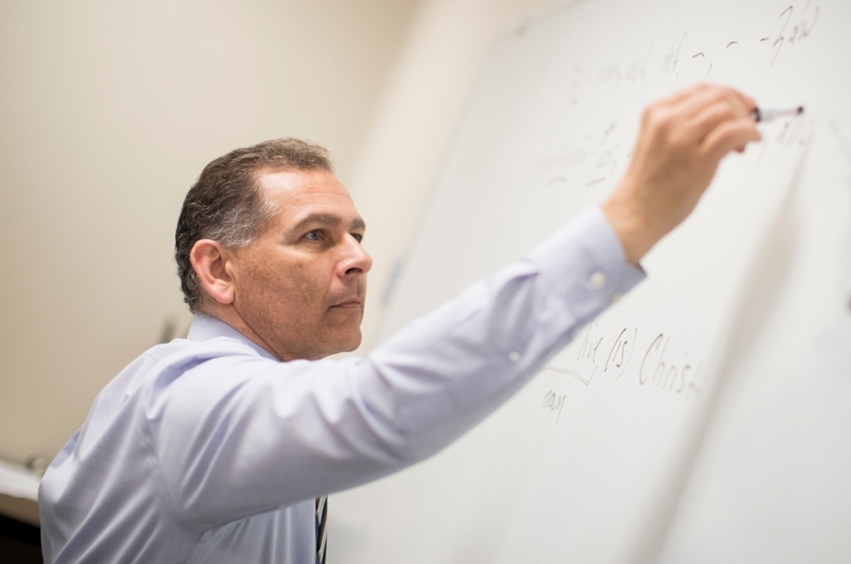Trust: Key to Dealing with a Life Interrupted
This article is over six months old and may reference former titles for DBU faculty or staff, discontinued programs, or other details that have since changed. If you have any questions, please contact us at news@dbu.edu, or (214) 333-5172.

The crisis caused by the COVID-19 virus has us obsessed with the news. We want to remain informed. Whenever there is a press conference with updates, we tune in. Staying informed is very important. Yet, such constant focus solely on the news can raise our anxiety and worry. The COVID-19 virus has interrupted our lives. Such unsettling circumstances can lead to unsettling emotions.
As the abundance of news about our circumstances, in recent days, there has also been an abundance of trusted Christian leaders offering words of peace, comfort, and strength based on the Word of God. Seek those out, reflect and meditate on them, be encouraged by them, act on them, and share them with others.
Yet, each of us can and should be encouraged by our own personal reading and meditation on God's Word. A constant theme throughout the Bible urges us to place our trust in God, regardless of the circumstances, especially in times of hardship. Such trust is based not on those shifting circumstances but on the trustworthiness of God who, as the whole of Scripture teaches us, is with us.
In the Old Testament, the word often translated trust (bātacḥ) carries the idea of having confidence in, placing one's hope in, and even resting in. It is translated into the Greek version of the Old Testament with the word for hope or confidence (Elpis). That same word is then used in the New Testament and rendered in English with the word hope. Yet in neither case is this a hope of wishful thinking; it is a confident expectation.
A large concentration of "trust" passages is found throughout the Psalms. They provide descriptions of those who trust in God as well as commands to trust in God. Psalm 13 opens with David's feeling of God's abandonment but concludes (v. 5) with a word of trust: "But I have trusted in Your lovingkindness" (God's covenant faithfulness). In Psalm 28, David again declares his trust in God, for "The Lord is my strength and my shield" (v. 7). He affirms his trust in God in Psalm 31:6 and 14.
So much of David's confidence in God was based on God's own faithfulness to him (see Psalm 52:8). Perhaps most fitting to current circumstances are his words in Psalm 56. When he was afraid, he trusted in God (v. 3) and because of his trust in God he would not be afraid (vv. 4 and 11). David commands others to trust in God: "Trust in Him at all times, O people; pour out your heart before Him; God is a refuge for us" (Psalm 62:8, NASB).
Other places speak of this trust as well. Proverbs 3:5-6 is a favorite text of many, "Trust in the Lord with all your heart and do not lean on your own understanding. In all your ways acknowledge Him, and He will make your paths straight."
Isaiah assured the faithful remnant that trust in the Lord would be their theme (12:2; 26:3). Jeremiah 17:5-7 juxtaposes the blessing upon those who trust in Lord (they are like trees planted by the water; cf. Psalm 1) over against those who trust in humanity. Daniel depicts trust in God in hard times (3:28; 6:23).
In the New Testament, Jesus commands against worry (Matthew 6:25-34) because of God's care for those who are his own. Jesus himself, named Immanuel, God with us, embodies the presence of God mentioned in the Old Testament. With his ascension, we still are assured of his presence, even his dwelling within us, by the Holy Spirit (John 14:16-17; Matthew 28:20).
The latter parts of the New Testament pick up on this idea of trust in the use of the word "hope." Paul's words in Romans 15:4 connects perseverance and the reading of Scripture (the OT) as a source of hope. In v. 13 he prays that his readers abound in hope by the power of the Holy Spirit as they are filled by the God of hope.
Dallas Baptist University President, Dr. Adam Wright, has adopted Joshua 1:9 as the theme verse for the current situation: "Have I not commanded you? Be strong and courageous! Do not tremble or be dismayed, for the Lord your God is with you wherever you go." The key for Joshua was the fact that God had promised him that He would be with Joshua wherever he went.
As you face your current circumstances, put your trust in God. He is with you. He has shown himself to be faithful. He will remain faithful.
For further reading: Psalm 9:10; 22:4, 5; 25:2; 32:10; 33:4, 21; 37:3, 5; 40:3, 4; 55:23; 56:3, 4, 11; 84:12; 86:2; 91; 111:7; 112:7; 115:9, 10, 11; 118:8, 9; 119:42, 138; 125:1; 143:8; Proverbs 16:20; 28:25; 29:25; 1 Tim. 6:17; Heb. 10:23
Dr. Joseph Matos is a professor of Biblical Studies at Dallas Baptist University.








